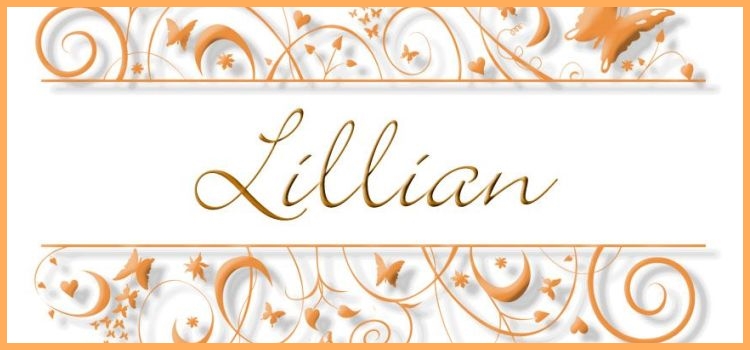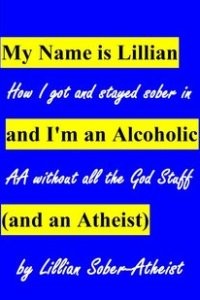Living with Lillian

Living with Lillian: A reader’s look at a pioneering book in secular recovery
by Joe C.
Supposedly, belief in God is not required to join AA, and one might even get sober, but according to the Big Book, finding belief in “God as we understood Him” is essential to staying off the bottle. I know that when I read the chapter, I wanted to toss the book into the nearest bonfire. There’s nothing quite like being patted on the head and sagely told “Hang in there; you’ll get it, stupid.” Okay, it doesn’t literally say that, but I took it that way. I’m here to say that profound, lasting sobriety is within your grasp. No bait and switch. You can believe in God, but it’s not required. You can use the concept of a Higher Power or not bother. There is no wrong way to get sober and stay sober. Doing this is a challenge, but as generations of hard-core alcoholics have shown, it can be done.
Isn’t that just a familiar refrain, these days? Well, there is an interesting story behind where this came from. After 20 years of drinking, at 36 years of age, Lillian found her way into AA and got sober. That was late last century. She’s an atheist, she’s a New Yorker. This quote is from her 2010 eBook, My Name is Lillian and I’m an Alcoholic (and an Atheist): How I got and stayed sober in AA without all that God stuff. And this book, a 2010 gift to the Fellowship, is one of the pioneering resources that a nonbeliever in AA can latch onto.
My Name is Lillian (the author’s pen-name) spans three years of what she calls “one side of a conversation about sobriety.” As an AA member Lillian participates in an email AA meeting from Monday February 6, 2006 to Monday October 18th, 2008. We get to tag along and you and I are going to learn a thing or two about Lillian, and if we’re lucky, ourselves as well.
In one regard, 2010 sounds like just yesterday. Some of us have never known – and others of us forget – a time where there wasn’t a dozen or more 12-Step books speaking out with secular candor. I am going to tell you why My Name is Lillian is a great book in its own right and if you’ve missed it, why you ought to discover it. But before we get too deep into talking about the book’s contents, let’s talk context. Addiction/Recovery professional Bill White shared recently of his personal experience with the admonitions from his mentor, the late Ernie Kurtz. These included seven pillars of reporting on history, context being one of them.
 The face to face (f-2-f) and online means of communication of 2015 make it easy to forget that the virtual AA is still in its early years. Agnostic/atheist f-2-f AA meetings numbered in the dozens – not hundreds – when Lillian was writing her book. So let’s go back a few years to the time that this story was unraveling, for context. Circa 2006: this was the time of MySpace, not Facebook / Hotmail, not Gmail. Who understood tweeting in 2006? Instagram anyone?
The face to face (f-2-f) and online means of communication of 2015 make it easy to forget that the virtual AA is still in its early years. Agnostic/atheist f-2-f AA meetings numbered in the dozens – not hundreds – when Lillian was writing her book. So let’s go back a few years to the time that this story was unraveling, for context. Circa 2006: this was the time of MySpace, not Facebook / Hotmail, not Gmail. Who understood tweeting in 2006? Instagram anyone?
Forget about it. Long before the term WAAFT or anything-agnostica, a road had to be beaten through the new frontier on which we surf today with ease and choice.
If you were thrust upon the rooms of 12-Step recovery in the last few years, your AA may have always been a pipeline to secular 12-Step recovery books and websites, available 24/7 on any Wi-Fi connected device. I forget sometimes that there was a pre-Facebook, pre-AA Agnostica, pre-WAAFT 12-Step culture.
Alcoholics Anonymous without Religion (AAWR) was a Yahoo group that started in October of 2005; It topped out at 1,688 posts a month in May of 2006. There was also AA-Freethinkers.org. These were some of the few early bastions or secular recovery and fellowship. Like dot.coms that are now dot-gones, AAWR and aa-freethinkers.org are gone or ghost-towns now. We all migrated to InTheRooms.com, Facebook, Google, newer Yahoo groups or a wealth of great recovery blogs just like AA Agnostica. We can debate if codified (written) AA is changing with the times. But AA members are certainly adapting with new technology.
So, in the context of this book coming from the first decade of the millennium, let’s consider that My Name is Lillian was an important part of the genesis of 21st century AA dialogue and community.
Reading Lillian’s book is like tagging along to meetings with her for three years between 2006 and 2008. How you consume the book is up to you. You can marathon through the book in a weekend or savor it a few pages a week until completed. Alternatively, you can just open it randomly and read a few pages and reflect on them.
We the reader, get real with Lillian’s life and sobriety. There is loss, illness, relationships, career highs and lows and a trip through some of the Twelve Steps and AA customs in real-time; as the author processes all of it, so do we. As other fellowships have borrowed from AA; Lillian borrows right back. We’ll hear about the Three Cs of Al-Anon, “I didn’t cause it; I can’t control it; I can’t cure it” or the Three As of Codependency, “Awareness, Acceptance and Action”. We join her for her ninth anniversary of her sobriety in February of 2006. She reflects on her drinking ten years earlier. She shares her trepidation with a Step Nine amends.
What is cool about this book is that it doesn’t have three acts, a beginning, conflict development and resolution; we dive right into her life at eight years sober as if she moved in next door. We have a new sober friend and we go to meetings together a few times a week for the next few years.
In Chapter 8 the author writes about one approach to sobriety:
I’m a great believer in the buffet philosophy: “Take what you need and leave the rest”. But what I need changes over time. So I keep both the baby and the bathwater (and the Steps) around just in case.
Unabashedly, Lillian shares about multiple addictions, therapy and “outside issues”. Chapter 11 says:
When I got sober, I felt no shame. I could have sung from the rooftops about my love of sobriety, but recovery from obsessive eating? I’d rather keep it a secret. Of course, if you could see me you might be able to guess that there is something happening in the food/eating department.
Recently, I’ve had some weight loss or as we say in OA (Overeaters Anonymous) “physical recovery.” I’ve lost about half of the amount I’d like to lose. It can all devolve into a numbers game with me. What I weigh, how many calories I eat, my goals, blah, blah, blah.
What I didn’t understand was that once I reach a comfortable weight, I don’t have to fail, throw in the towel and start to gain it all back. Instead, I could let go of the food obsession and allow my feelings to come forward. One of the sayings in OA is “It’s not what you’re eating. It’s what’s eating you.”
When I repress my emotions, often something else, like the ability to recognize when I’m full and don’t need an ice cream sandwich, goes haywire.
Talking with my therapist opened the door for me to be healthy in recovery both emotionally and physically.
Adversity hits — I feel concerned, as anyone would with a friend. We hear Lillian recount her years of addiction and debauchery. She talks about translating the AA program; turn it over… to whom, what, why? What is it about that first drink? There is the business of deciphering emotional sobriety, career and relationship highs and lows. The book is told in such a way that I want to intervene or to encourage her as if she was across the coffee table from me. I became invested.
She ends the book by expanding on topics she thought she should discuss more — sex and relationships, anger, overcoming compulsion.
Lillian was one of the first to offer us seekers scripts for starting our own agnostic AA group. My Name is Lillian isn’t opinion, criticism or analysis of AA; it’s 100% personal journey so there’s nothing to disagree with, just a few things that any open-minded reader could learn from to enrich her or his own life. You can get it online for less than a latte.
Copies of My Name is Lillian are available as a Kindle or as an iBook.

























Happy to see this post and purchased the Kindle version already. THANKS!
One of the struggles of the emerging wAAft movement is being able to simply and clearly articulate a robust, coherent solution to the problem of alcoholism. Bashing religion or traditional AA is a seductive (and perhaps inescapable) tendency, but it’s woefully incapable of getting anyone sober. What I like about Lillian’s book is that it is refreshingly free of any preoccupation with the god question. It just models recovery and does it in a way that even religious AA members can relate to. It thereby claims AA’s principle of unity as its own home turf.
Thanks, Joe, for providing us with the context for this eBook. It adds an extra dimension for our understanding of when she was inspired to write this on behalf of the secular among us.
Thanks so much, Joe, for this review. As a former New Yorker who received the gift of soberity in Manhattan in the 70s, I’ll be very interested to read her book about her experience of sobriety in New York in the 2006-2008 timeframe. Before I visited you good folks up in Toronto, I spent four days in Manhattan and attended a number of the meetings where I got sober. My experience was that even in New York AA meetings have become much more doctrinaire in their format with formulaic readings of How It Works, etc., which differs considerably from what we did in the 70s. Only the Perry Street Workshop, and of course the WAAFT meeting I attended in the Stephen Wise Synagogue, were fully nonbeliever safe . . . 😉
Excellent. I was fortunate to get sober around several long-term non-theists, even though I was a “generalist theist” for some time in early sobriety (just to keep it simple, since I had a theological/religious background). Already picked up the Kindle version and look forward to reading it.
I totally read that in your voice Joe C.